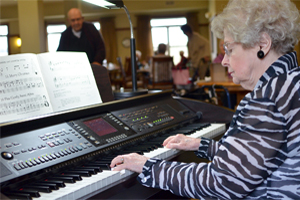Gratitude is often described as a simple practice, but its impact can be life-changing – especially for seniors and the caregivers who support them. Whether expressed through a conversation, a quiet moment, or a small daily ritual, gratitude can improve overall well-being. Let’s explore how embracing gratitude can make life more meaningful for both seniors and caregivers.
Why Gratitude Matters For Seniors
1. Encourages a Positive Mindset
For seniors, daily life can bring changes in routine, health, or independence. Gratitude helps shift focus away from limitations and towards moments of beauty and joy. Even something as simple as appreciating a cup of coffee or a visit from a friend helps strengthen positivity.
2. Helps Maintain a Sense of Identity
As people grow older, they often reflect more deeply on their life experiences. Gratitude gives seniors a way to honor their past while appreciating the present. It reinforces the value of their wisdom, memories, and accomplishments, helping them feel confident in who they are.
3. Creates Opportunities for Connection
Sharing gratitude helps seniors feel more engaged with people around them. Whether it’s thanking a neighbor, recognizing a caregiver’s kindness, or appreciating time with family, gratitude creates deeper, more meaningful relationships.
4. Enhances Daily Enjoyment
Even small moments – sunlight through a window, a favorite song, a hobby – become more intense when viewed with gratitude. This shift in awareness helps seniors enjoy a more satisfying day-to-day life.
Why Gratitude Matters for Caregivers
1. Helps Caregivers Stay on Track
Caregiving requires patience, empathy, and emotional strength. By noticing moments of connection, caregivers can maintain a sense of purpose and stay grounded during stressful times.
2. Improves Emotional Balance
Caregiving can be emotionally demanding. Practicing gratitude encourages caregivers to acknowledge what is going well, even on difficult days. This helps reduce feelings of overwhelm and fosters a calmer mindset.
3. Strengthens the Caregiving Relationship
Expressing appreciation – both giving and receiving it – helps create trust and mutual respect. When seniors and caregivers acknowledge each other’s kindness, their relationship becomes more supportive.
4. Encourages Reflection and Growth
Gratitude gives caregivers a chance to reflect on the meaningful impact they’re making. Recognizing the importance of their role can rekindle motivation and a deeper sense of personal fulfillment.
Conclusion
What makes gratitude great is that it doesn’t require anything complicated. Seniors and caregivers can incorporate it into their lives through journaling, conversation, prayer, or simply pausing to notice a meaningful moment.
When gratitude becomes a daily habit, it creates a ripple effect: brighter moods, stronger relationships, and a deeper appreciation for the experiences of giving and receiving care.
Ultimately, gratitude reminds both seniors and caregivers that – even with change, stress or uncertainty – there is still so much to hold close.






